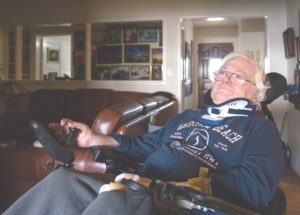By Susan Jaffe | Kaiser Health News in collaboration with National Public Radio | October 27, 2014
 A 78-year-old Vermont mother of four who helped change Medicare coverage for millions of other seniors is still fighting to persuade the government to pay for her own care.
A 78-year-old Vermont mother of four who helped change Medicare coverage for millions of other seniors is still fighting to persuade the government to pay for her own care.
Glenda Jimmo, who is legally blind and has a partially amputated leg due to complications from diabetes, was the lead plaintiff in a 2011 class-action lawsuit seeking to broaden Medicare’s criteria for covering physical therapy and other care delivered by skilled professionals. In 2012, the government agreed to settle the case, saying that people cannot be denied coverage solely because they have reached a plateau and are not getting better.
The landmark settlement was a victory for Medicare beneficiaries with chronic conditions and disabilities who had been frequently denied coverage under what is known as “the improvement standard” —a judgment about whether they are likely to improve if they get additional treatment. It also gave seniors a second chance to appeal for coverage if their claims had been denied because they were not improving.
Jimmo was one of the first seniors to appeal her original claim for home health care under the settlement that bears her name. But in April, the Medicare Appeals Council, the highest appeals level, upheld the denial. The judges said they agreed with the original ruling that her condition was not improving — criteria the settlement was supposed to eliminate.
After running out of options appealing to Medicare, her lawyers filed a second federal lawsuit in June to compel the government to keep its promise not to use the improvement standard as a criterion for coverage.The council’s decision makes no sense to Judith Stein, executive director of the Center for Medicare Advocacy, which filed the original class action lawsuit with Vermont Legal Aid and helped negotiate the Jimmo settlement. “People shouldn’t have to decline in order to get the care they need,” Stein said. [MORE from Kaiser Health News and NPR] …


 antipsychotic drugs to staffing. Some are required by the Affordable Care Act and other recent federal laws, as well as the president’s executive order directing agencies to simplify regulations and minimize the costs of compliance.
antipsychotic drugs to staffing. Some are required by the Affordable Care Act and other recent federal laws, as well as the president’s executive order directing agencies to simplify regulations and minimize the costs of compliance. in a nursing home or long-term care facility, they need to know that their loved one’s health and safety are priorities.”
in a nursing home or long-term care facility, they need to know that their loved one’s health and safety are priorities.”


 Milford, population 2,100, Dr. Robert Wergin understands it’s not easy for some of his older patients to get to his office. Some may live on isolated farmsteads several miles out of town, and if they don’t drive, their son or daughter—if nearby—may have to take time off from work to bring them to their appointments because there’s no public transportation. Massive snowstorms are nothing special but still cause a wave of cancellations.
Milford, population 2,100, Dr. Robert Wergin understands it’s not easy for some of his older patients to get to his office. Some may live on isolated farmsteads several miles out of town, and if they don’t drive, their son or daughter—if nearby—may have to take time off from work to bring them to their appointments because there’s no public transportation. Massive snowstorms are nothing special but still cause a wave of cancellations. A disabled senior with serious health problems who successfully challenged Medicare for denying her home health care coverage has racked up another win against the government.
A disabled senior with serious health problems who successfully challenged Medicare for denying her home health care coverage has racked up another win against the government. man Services Secretary Kathleen Sebelius. In January, a federal judge approved a settlement in which the government agreed that this “improvement standard” is not necessary to receive coverage.
man Services Secretary Kathleen Sebelius. In January, a federal judge approved a settlement in which the government agreed that this “improvement standard” is not necessary to receive coverage.